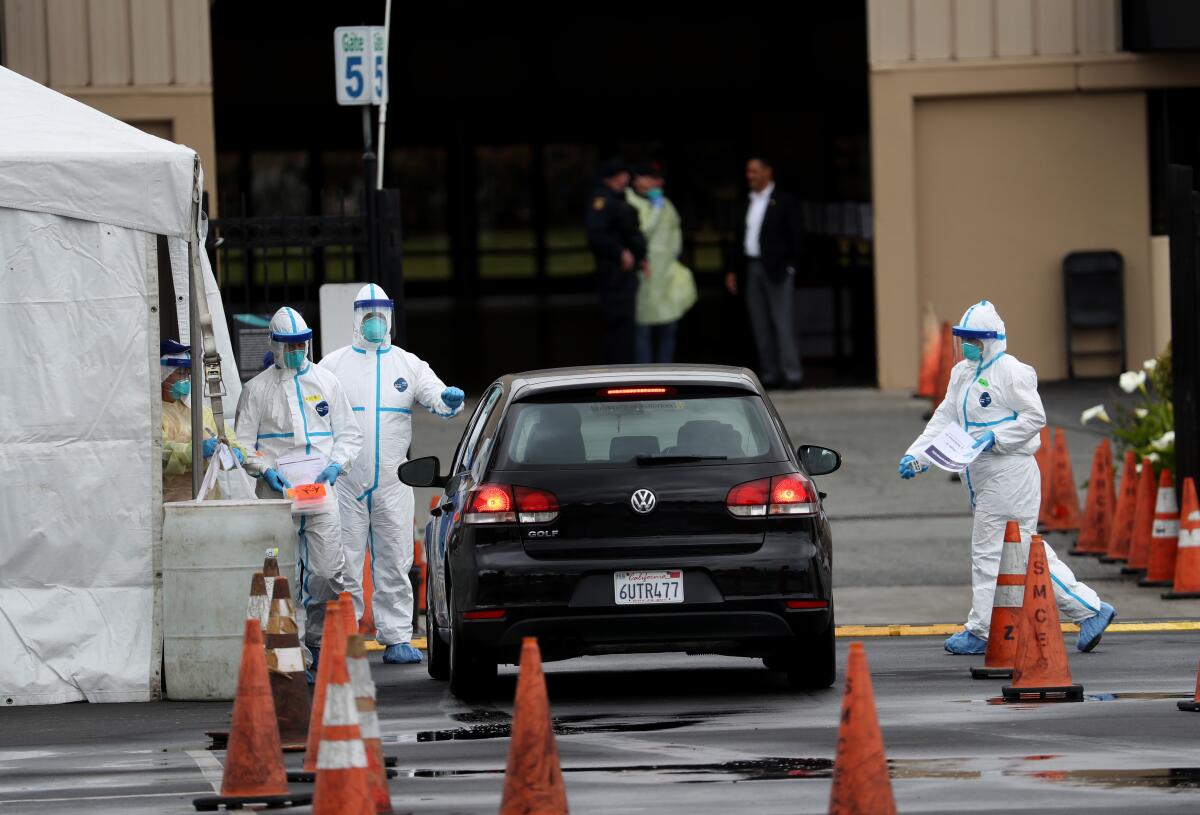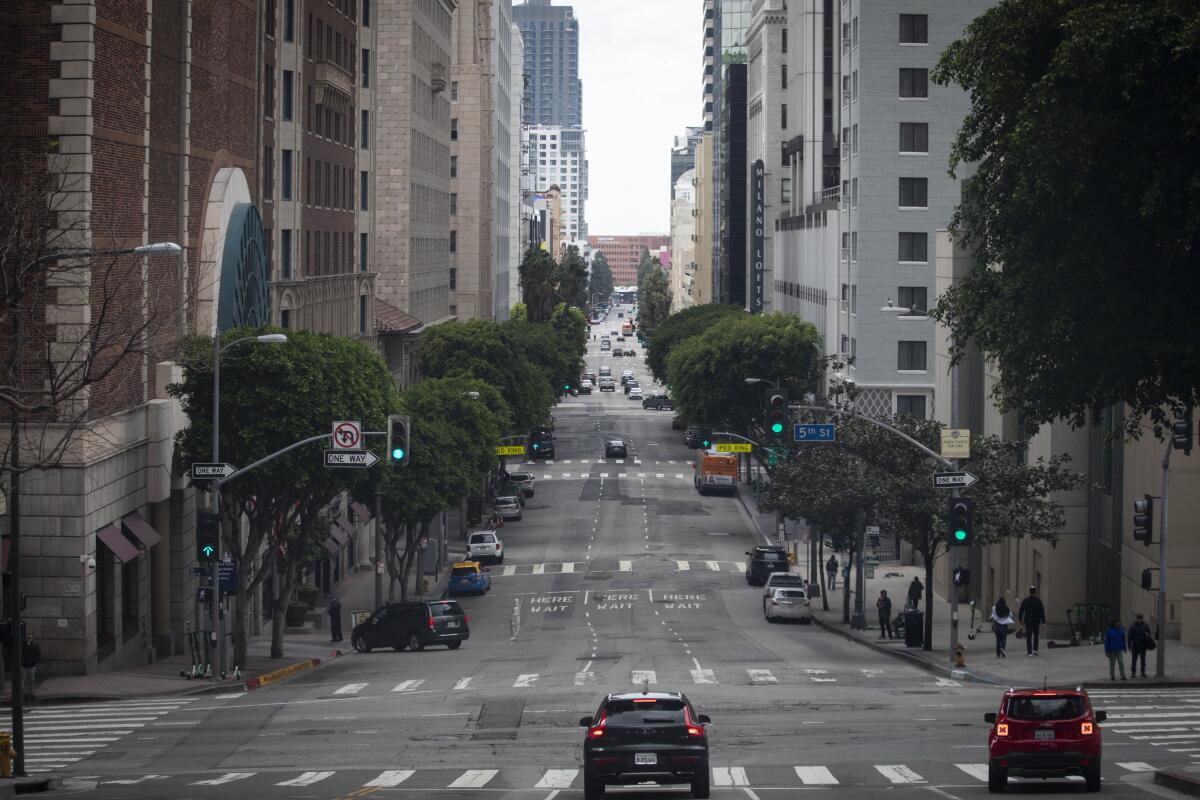Newsletter: Shelter-in-place orders in seven Bay Area counties

Good morning, and welcome to the Essential California newsletter. It’s Tuesday, March 17, and I’m writing from Los Angeles.
Start your day right
Sign up for Essential California for news, features and recommendations from the L.A. Times and beyond in your inbox six days a week.
You may occasionally receive promotional content from the Los Angeles Times.
On Monday, seven counties in the Bay Area issued a shelter-in-place order in a bid to slow the spread of the new coronavirus. The order from San Francisco, Santa Clara, San Mateo, Marin, Contra Costa, Alameda and Santa Cruz counties will close virtually all businesses and direct residents to remain at home for the next three weeks. The Bay Area has been the hardest hit region in California in terms of coronavirus cases.
[Read the story: “As coronavirus spreads, 7 Bay Area counties ordered to shelter in place” in the Los Angeles Times]
Officials are directing the public to stay at home as much as possible, with certain exceptions, such as going out to get food at supermarkets, picking up prescriptions at the pharmacy, buying gas, going to the bank and checking up on relatives. Only police and fire departments, hospitals, grocery stores, gas stations, banks and pharmacies and restaurants serving takeout and delivery customers will be allowed to remain open under the shelter-in-place order, officials said.
[See also: “How the San Francisco Bay Area coronavirus ‘shelter-in-place’ order works” in the Los Angeles Times]
There is at least one exception: A Tesla electric vehicle factory in Fremont was deemed “essential” by Alameda County, and will remain open, according to a county spokeswoman. In an email to employees obtain by The Times, Tesla Chief Executive Elon Musk wrote, “I will personally be at work, but that’s just me,” telling employees they should not feel obligated to come in — but also downplaying the danger of the virus.
[Read the story: “Stay home if you want, Musk tells Tesla workers as Fremont plant stays open” in the Los Angeles Times]
Nevertheless, citing the need to “align” the efforts of local and state officials to combat the spread of the novel coronavirus, Gov. Gavin Newsom said Monday night that all California restaurants should close their doors to dine-in customers and that gyms, health clubs and movie theaters should also shutter their operations. Like Newsom’s previous guidance, these directives remain recommendations and not orders.
L.A. County officials also took extraordinary measures to stem the number of cases in their region earlier in the day, announcing the closure of all bars, fitness centers and movie theaters and directing restaurants to move to takeout only. The directive applies to unincorporated regions and all 88 cities in the county, including the city of Los Angeles, which had already issued a similar directive Sunday. (Unlike at the state level, these are orders and not recommendations.)
Meanwhile, President Trump announced new guidelines that urge people to participate in schooling from home, avoid eating and drinking at bars and restaurants and food courts, avoid discretionary travel from home and avoid gathering in groups of more than 10.
But back to California. As of Monday evening, there were 94 total known COVID-19 cases in L.A. County and 392 known cases across the state.
At least 15 of the new cases reported over the last 48 hours in L.A. County were probably due to community transmission, leading the county’s public health director to say that at this point, residents “must assume that there may be people who are infected everywhere in the county.” Officials said that all hospitals were preparing for a surge in patients.
[Read the story: “L.A. County says assume coronavirus is now in your community. Here is what you need to know” in the Los Angeles Times]
My colleague Brittny Mejia wrote about a group of housekeepers who have met every morning for years at a Westwood cafe for coffee and conversation before starting their workday. Their numbers at the cafe have begun to dwindle over the past month as more and more employers tell their domestic workers to stay home.
[Read the story: “As coronavirus spreads, housekeepers in L.A. declare staying home ‘a luxury’” in the Los Angeles Times]
Sitting with a handful of other women at the cafe, Doralicia Bermudez told Brittny that one of the families she works for had canceled on her over coronavirus fears.
“They don’t pay,” Bermudez said. “And the bills keep coming.”
For these women — many of whom take the bus to work and are now contending with LAUSD school closures — staying home remains a luxury. Bermudez was on her way to another job that day.
Like most 21st century stories, this pandemic will also be a story about inequity.
Of course, money can’t inoculate anyone from the actual virus, as the growing list of celebrities and world leaders with confirmed COVID-19 cases makes clear. But personal finances and the ability to insulate oneself from risk have long been deeply entwined in American life. And the rippling effects of the virus have already put the holes in our social safety nets on glaring display.
Everyone is hurting. But there will be a stark divide between those of us who can comfortably work from home and still receive a paycheck, and those of us who have no choice but to continue to serve customers in high-risk, heavily trafficked environments. At least as long as those establishments remain open.
The ability for some of us to remain safely ensconced in our houses for what may be weeks or months on end will also probably be made possible by app-based gig workers braving their own exposure to make deliveries.
So, what can you do if you’re one of the comparatively lucky ones? If you order deliveries, be extra kind and tip extra generously. If people work in your home, let them stay home but continue to pay them. You can help the small businesses in your community stay afloat by purchasing gift cards, ordering takeout and delivery from restaurants and buying online from brick-and-mortar independent stores.
If you already have enough in your pantry to last you through a two-week self-quarantine, stop panic-buying. Our food supply chain remains strong, meaning that even if grocery stores might need a day or two to restock, there will still be plenty more food coming. But the barren shelves make it more difficult for those who can’t afford to stockpile to find food on the day-to-day. Check on your neighbors. Most of all, be decent.
World Health Organization director Tedros Adhanom Ghebreyesus said Monday that crises such as pandemics tend to bring out the “best and worst in humanity.”
The world is probably still early in this outbreak, he added. “The days, weeks and months ahead will be a test of our resolve, a test of our trust in science and a test of our solidarity.”
Sign up for Coronavirus Today, a new special edition of the Los Angeles Times’ Health and Science newsletter that will help you understand more about COVID-19.
And now, here’s what’s happening across California:
L.A. STORIES
L.A. on coronavirus lockdown. Here is what you need to know about what’s closed and open. Los Angeles Times

Los Angeles school officials have halted a plan to open 40 family resource centers, citing health risks. The 40 planned centers were intended as a service point and refuge for students and families in need of food, childcare, counseling and educational materials. Instead, 60 grab-and-go food centers will be available for school families. Los Angeles Times
Los Angeles will temporarily stop ticketing cars during street sweeping and relax its enforcement of some other parking rules, Mayor Eric Garcetti said Monday. Los Angeles Times
Enjoying this newsletter?
Subscribe to the Los Angeles Times.
POLITICS AND GOVERNMENT
California lawmakers have approved a plan to spend as much as $1 billion on the state’s emergency medical response as it readies hospitals to combat an expected onslaught of patients due to the pandemic. Los Angeles Times
After approving the plan, the California Legislature announced what is believed to be its first unexpected work stoppage in more than 150 years. In an attempt to help contain the illness, legislators will suspend their work until April 13. “We will be prepared on a moment’s notice to return to address any urgent action that we must take,” Senate President Pro Tem Toni Atkins said. Associated Press
Joe Biden says he wants a female running mate. The declaration from the front-runner for the Democratic presidential nomination set off a flurry of speculation about who might join him on a potential ticket. Los Angeles Times
What’s happening with Bay Area public transit during the shelter-in-place order? Public transit in the Bay Area will remain operational, but only for essential travel, and riders are ordered to keep 6 feet apart. San Francisco Chronicle
CRIME AND COURTS
The Supreme Court has called off oral arguments in the first postponement of its kind in 102 years. Los Angeles Times
All Los Angeles County court proceedings will be suspended for the rest of the week as concerns about the spread of the COVID-19 virus continue to mount, according to an internal email reviewed by The Times. Los Angeles Times
CALIFORNIA CULTURE
Actor Idris Elba is the latest celebrity to test positive for the coronavirus. “I feel OK. I have no symptoms so far but have been isolated since I found out about my possible exposure to the virus,” the actor said Monday in a post on Twitter. Los Angeles Times
Major League Baseball is pushing back start of the season to mid-May at the earliest. The challenge in projecting a timeline for reopening training camps and starting the season is that no one can project the timeline for the progression of the coronavirus. Los Angeles Times
Numbers are increasing at many public and private California campgrounds as shutdowns, cutbacks and other coronavirus-related troubles lead legions of Americans to stay away from hotels and airports. Los Angeles Times
San Francisco’s cable cars have shut down to protect operators from the coronavirus. San Francisco Chronicle
Amazon plans to hire 100,000 workers over the next 18 months across the U.S. to keep up with a crush of orders as the coronavirus kept more people at home, shopping online. Los Angeles Times
CALIFORNIA ALMANAC
Los Angeles: rain, 57. San Diego: sunny, 62. San Francisco: cloudy, 55. San Jose: cloudy, 57. Fresno: partly sunny, 58. Sacramento: cloudy, 46. More weather is here.
AND FINALLY
Today’s California memory comes from Barbara Zumwalt:
“I remember a previous pandemic that we all survived. The ‘Hong Kong flu’ hit in Christmas 1968. My sister brought it home from school, and she and my parents were in bed for days while my brother and I remained healthy. Every day, mom gave us a dollar from her purse. We walked to the store and bought TV dinners. One day, my brother overheard mom asking a friend to bring her cash. He thought we were running out of money, not just cash on hand. He no longer allowed me to have my favorite, 37-cent, turkey meal. He made me, instead, take the 35-cent chicken meal. We still laugh about it today.”
If you have a memory or story about the Golden State, share it with us. (Please keep your story to 100 words.)
Please let us know what we can do to make this newsletter more useful to you. Send comments, complaints, ideas and unrelated book recommendations to Julia Wick. Follow her on Twitter @Sherlyholmes.
Start your day right
Sign up for Essential California for news, features and recommendations from the L.A. Times and beyond in your inbox six days a week.
You may occasionally receive promotional content from the Los Angeles Times.




